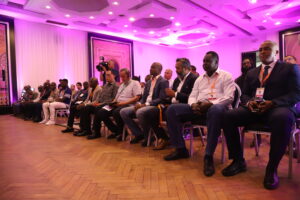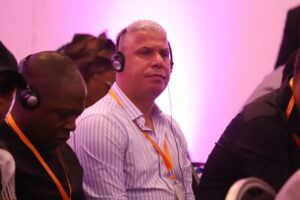A high-level conference titled “Morocco within its continent: a South-South, win-win, active, and united partnership football, a factor of African integration and global visibility for the Continent” was organised by the Amadeus Institute.
This gathering of important figures from the football world, political decision-makers, experts, and the glories of African football was organised on the eve of the U23 African Cup of Nations being held in Morocco in the presence of 46 African FA Presidents and on the eve of the CAF Executive Committee meeting in Rabat. All were committed to promoting South-South cooperation in Africa and an Africa that trusts Africa.

The conference featured fruitful discussions and frank interactions, highlighting the Kingdom of Morocco’s continuous dedication to multifaceted collaboration in Africa, inspired by the Vision.
Which promotes a more cohesive, connected, and independent Africa is that of His Majesty King Mohammed VI, may God help Him. The Kingdom has made it clear that it is committed to deepening its ties with African countries in order to promote economic cooperation, regional integration, and sustainable development on the continent.

This has been done through more than fifty Royal Visits to the continent and the signing of more than 5,000 bilateral agreements.
In this context, the conference emphasised the essential function of football as a tool for South-South cooperation to promote African integration, particularly in light of the 46 partnerships established by the Royal Moroccan Football Federation for the transfer of skills and expertise, as well as for football infrastructure and the promotion of women’s football.

Soccer’s significance as a global language was stressed by speakers.
Crosses boundaries and cultural barriers, strengthens international relations, and promotes understanding across nations.
The benefits of further continental collaboration in this area were underscored by highlighting soccer’s potential for growth and integration.

The significance of establishing a Pan-African Think Tank on Development Through Football was another significant recommendation made at the meeting.
This Think Tank could act as a platform for collaboration, bringing together specialists, political decision-makers, and representatives from the sporting world to develop policies and initiatives aimed at promoting soccer’s crucial contribution to the growth and influence of Africa in all of its forms.

The Conference’s suggestions assist the efforts of the Kingdom of Morocco and other African nations to foster long-term collaboration and the development of African talent.





